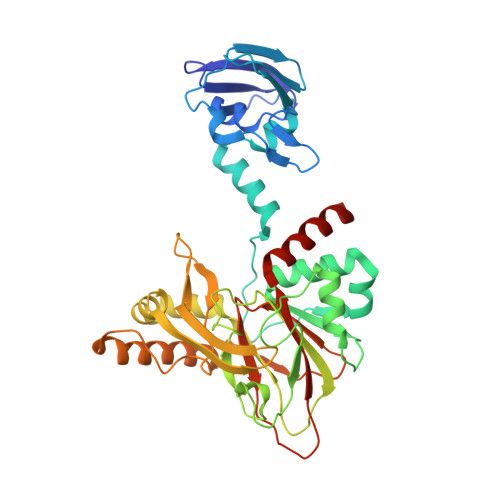Targeting Carnitine Biosynthesis: Discovery of New Inhibitors Against Gamma-Butyrobetaine Hydroxylase.
Tars, K., Leitans, J., Kazaks, A., Zelencova, D., Liepinsh, E., Kuka, J., Makrecka, M., Lola, D., Andrianovs, V., Gustina, D., Grinberga, S., Liepinsh, E., Kalvinsh, I., Dambrova, M., Loza, E., Pugovics, O.(2014) J Med Chem 57: 2213
- PubMed: 24571165
- DOI: https://doi.org/10.1021/jm401603e
- Primary Citation of Related Structures:
4BG1, 4BGK, 4BGM, 4BHF, 4BHI, 4C5W - PubMed Abstract:
γ-Butyrobetaine hydroxylase (BBOX) catalyzes the conversion of gamma butyrobetaine (GBB) to l-carnitine, which is involved in the generation of metabolic energy from long-chain fatty acids. BBOX inhibitor 3-(1,1,1-trimethylhydrazin-1-ium-2-yl)propanoate (mildronate), which is an approved, clinically used cardioprotective drug, is a relatively poor BBOX inhibitor and requires high daily doses. In this paper we describe the design, synthesis, and properties of 51 compounds, which include both GBB and mildronate analogues. We have discovered novel BBOX inhibitors with improved IC50 values; the best examples are in the nanomolar range and about 2 orders of magnitude better when compared to mildronate. For six inhibitors, crystal structures in complex with BBOX have been solved to explain their activities and pave the way for further inhibitor design.
- Biomedical Research and Study Centre , Ratsupites 1, LV1067 Riga, Latvia.
Organizational Affiliation:




















